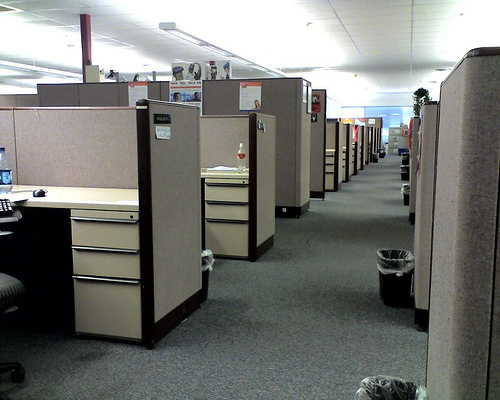In December 2010, President Obama signed the Telework Enhancement Act into law. By doing so, the government finally acknowledged what coworkers have known for years–working in an office doesn’t guarantee quality work.
Creating a network of remote workers allows companies to be more dynamic, responsive, and nimble. Allowing workers to telecommute not only saves a company money but also attracts talented independent professionals who want the freedom to choose their own projects
Even with a company to report to remote workers still get lonely, which is why many have joined coworking spaces to recreate the camaraderie of an office without the cubicles.
Over the past few weeks, I polled some coworkers to find out how they started telecommuting and get their advice about broaching the subject with mangement. Here’s what they had to say.
Plead Your Case (Or Don’t)
Companies are resistant to change, especially when it happens quickly or decreases their control, but that doesn’t mean your hope of coworking is doomed. All you need is a compelling argument that shows how the company or client will benefit. (Feel free to let them hear the desperation in your voice).
“I didn’t give my employers much choice, said Mike, a Sales & Maketing director for Morgan & Claypool Publishers.” I phrased it as 50 percent productivity and 50 percent mental health, each of which have a big influence on the other. Both were sinking fast at the time. Three years later, both have visited my coworking space several times and love it.”
For some, the move to telework is the only way to stay with a company they love when geography gets in the way.
“We were expecting our second child, and my wife told me that she was going to go live near family, and would really like if I came along,” said Brian, a programmer that coworks from Cohere. “I basically told my boss ‘I’m going to be moving, and I would like to continue remotely.’ We already had a number of remote folks, so it wasn’t a problem.”
More than one remote worker said that they made the switch from home office to coworking without consulting their company, and then let the results speak for themselves. If you’re willing to pay out of pocket, this might be the path of least resistance.
“I was going crazy working from home. It was too isolating on a regular basis and I needed the interaction,” said Holly, Director of Client Services for a Hong Kong consulting firm who now works from Office Nomads in Seattle. “I won a free month of membership and it drastically improved how I was working. There wasn’t any convincing needed once they found out the reason I was more productive.”
If you need help supporting your argument, check out How Coworking Fits Into The Future of Work, What Coworking Brings To The Community Table, and What’s Working In Coworking.
Be Accountable
No one likes to be micro-managed, and many fear that asking to cowork would only invite a flood of productivity requirements. Not so, say many of the remote workers: prove that you can be accountable, and most managers will let you do your thing.
“I wouldn’t say that my company puts any stipulations on me to make sure I’m really working while I’m coworking,” said Robyn, a Seattle-based urban planner who works for a New Jersey firm. “They obviously knew me and my work ethic well enough to let me telecommute and cowork in the first place. We talk and email several times a day, so as long as I’m around when they need me and I’m still producing good work for them, they don’t micromanage.”
Others say project management software helps them stay on track and reassures employers that things are progressing on schedule.
Warner, whose company now pays for he and two other remote employees to work at Spoke6, uses Scrum to help keep his team on track and provide self check-in times so the company can see they’re working on the right things at the right time.
“We have objectives we must meet,” said Dann, a Colorado-based software engineer who works for a UK-based company. “We’re also required to be available online during a regular set of ‘core hours’ – though I think that’s more for communication than making sure we’re working at any given moment.
Demonstrate to your company that you’re willing to explore arrangements that allow for some supervision, and it may open up a few possibilities.
Emphasize Education
If you tell your boss coworking will help you to be more productive, it’s important to back it up with some proof. But, say successful remote coworkers, that proof doesn’t always have to been measureable or even tangible. Coworkers are always learning from and teaching each other (and it’s way cheaper than sending employees to a profesional conference twice a year).
“Co-working gives me a different perspective on things as most of the people at co-working spaces are not doing the same thing,” said Warner. “So we chat about other things than software development. Most of us are in tech so there is that commonality, but it’s refreshing to hear about other projects going on, iOS development, Linux development, graphic design, etc. that may be going on.”
…And Sanity
“At this point I can’t imagine working anywhere else,” said Mike. “This is where I am most productive and happy. I have since hired another sales & marketing person to work with me at Office Nomads (and we’ve added a second desk to our membership).”
“It hasn’t brought me any new clients or more money or anything tangible like that,” said Wired.com science writer Lisa, “but in the sense that I have people to bounce ideas off of and fuel my enthusiasm, my career has benefited enormously from my coworking community.”
Want to learn more about the wonderful world of coworking, and its benefits for remote workers? Join the Coworking Google Group or check out the Global Coworking Wiki.
Do you telecommute? Think coworking would help you be more productive/connected? Share your thoughts in a comment!









